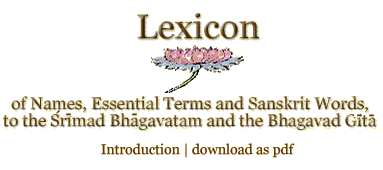
A|B|C|D|E|F|G|H|I|J|K|L|M|N|O|P|Q|R|S|T|U|V|W|X|Y|Z
Y
Y‚davas: another name for the Yadus.
Y‚ma: motion, course, going, progress; one eight portion of a day, a period of about three hours, two n‚dik‚s or dandas of about thirty minutes (3.11: 8).
Y‚tudh‚nas: (from y‚tu, sorcery, going against and dh‚na, covering) practicioners of tricks and black magic. Class of demons following lord S'iva.
Yadu: the eldest son of Yay‚ti, brother of Puru, who was disobedient to his father and therefore was denied by him to be his successor.
- The name of Krishna's family described in 9.23: 18-19 (His familyclan setting Him apart from the Bhojas of Kamsa was called Vrishni, which means strong, virile and bull) see also family-tree.
- Because of the curse of Yay‚ti (see 9.18: 42), says Krishna (in 10.45: 13), that one from Yadu should not sit on the throne.
Yaddrichay‚-copapannam: (arrived-of-its-own) without one's knowing. Concerns the innocence of defending Krishna's interests.
YajŮa: (sacrifice) name for Vishnu as the Lord of the Sacrifice. According karma, varn‚s'rama and svadharma must everyone who wants to be happy make offerings unto Vishnu (expressed as: jŗknjŗ).
- Vedic offering, systematically done. A sacrifice, activity to please Lord Vishnu or the demigods.
YajŮa-purusha: the ultimate Personality of all sacrifices.
YajŮesvara: name of Lord Krishna - the controller of the sacrifices.
YajŮabhuk: name of the Lord as the enjoyer of the sacrifices.
Yakshas: the treasure keepers, attendants of Kuvera, the keepers of wealth, semi-divine beings sometimes considered as ghosts and spirits of demoniac possession.
Yama: austerities, first part of ashth‚nga-yoga, also called the great vow; the don'ts, what one abstains from. Other parts are: ahims‚: nonviolence, satya: truthfulness, asteya: non-stealing, brahmac‚ryana, celibacy and aparigraha: non-appropriation. Nonviolent one becomes effective and without desire is one of the commitment that gives the right understanding for the meaning of life.
- According to Krishna: 'Nonviolence, truthfulness, not coveting or stealing the property of others, detachment, humility, non-possessiveness, belief in God, celibacy as also silence, steadiness, forgiveness and fearlessness' (see 11.19: 33.35).
Yamar‚ja or Yama: also called Dharma, the son of the sungod, Lord of Death, the Lord of retribution. The demigod awarding sinners punishment after their death. Belongs to the twelve mah‚janas (see also S.B. 5.26).
YamadŻtas: the helpers of Yamar‚ja.
Yamun‚c‚rya: a great spiritual teacher in the S'rÓ-Samprad‚ya, one of the most important lines of disciplic succession.
Yamun‚: the river near Vraja where Krishna played.
Yas'od‚: Lord Krishna's stepmother, His stepfather was called Nanda and His brother Balar‚ma. His actual father and mother were Vasudeva and Devak Ó. They were kept in jail by Kamsa from the time he knew that Krishna would be born. For that reason was the child Krishna lodged with foster parents.
Yas'od‚-nandana: Yas'od‚'s child, Krishna.
Yavanas: foreigners or barbarians, Greeks and later also Muslims, also called mlecchas or meat-eaters (see 4.27: 23).
Yay‚ti: or N‚husha, the son of Nahusha, called the king who because of his lust was cursed by the sage Sukr‚c‚rya to age before his time (see also Yadu and Puru).
Yayur: see Vedas
Yoga: science of the unification or association of consciousness; the linking up of oneself with the absolute truth or God. Yoga in the broader sense is divided in three to the unification in knowledge, to the workload and to devotion: jŮ‚na, karma and bhakti-yoga (see also trik‚nda). Narrowly defined as being mystical it refers to the practice of ashth‚nga yoga, the eightfold path (Krishna) of which the division of hatha, bodily postures for meditation in the West became popular as yoga. Krishna carries the name Yogis'vara or Lord, Controller of Yoga, but also lord S'iva is considered the yogÓ of yogÓs. The science of yoga is the foundation of the Hindu belief with Vy‚sadeva as the chief defender and writer of its classical order (see also hatha yoga, karma yoga, jŮ‚na yoga, buddhi yoga and kriy‚ yoga).
- The act of yoking, joining, attaching, harnessing, putting to (of horses); any junction, union, combination, contact with; a remedy, cure; a means, expedient, device, way, manner, method;employment, use, application, performance.
- The union of the individual soul with the universal soul.
- Devotion, pious seeking after God.
- Contact or mixing with the outer world.
- Conjunction, lucky conjuncture of a star.
- Krishna (B.G. 2:48): connectedness, equanimity, balance of mind.
There are six systems of philosophy or darshanas around the yoga, developed in response to counter materialistic, jainistic and buddhistic views:
1: vaisheshika; atheistic; metaphysical, atomic view. Propagator: Kan‚da.
2: ny‚ya; logic; method, epistomology, dialectics. Propagagor: Gautama.
3: s‚nkhya, dualistic realism; division, enumeration of elements. Propagator: Kapila.
4: yoga, the eightfold path of ashth‚nga; differention between the personal and the material. Propagator: PataŮjali.
5: karma-mÓm‚ms ‚: exegesis and sacrificing from the idea of a multitude of souls and substance; culture to the hymns of the early Veda also called purva-mÓm‚ms‚. Propagator: Jaimini.
6: ved‚nta: conclusion, exegesis, commentary at the end of. Ved‚nta-sŻtra or of Brahma-sŻtra as the commentary on the Upanishads. The later Veda also thus called uttara mÓm‚ms‚. Propagator: Bh‚dar‚yana (Vy‚sa).- The parampar‚ states in 10.87: 25: 'Of the six orthodox philosophies of Vedic tradition. - S‚nkhya, Yoga, Ny‚ya, Vais'eshika, MÓm‚ms‚ and Ved‚nta - only the Ved‚nta of B‚dar‚yana Vy‚sa is free of error, and even that only as properly explained by the bona fide vaishnava ‚c‚ryas. Each of the six schools, nonetheless, makes some practical contribution to vedic education: atheistic S‚nkhya explains the evolution of natural elements from subtle to gross, PataŮjali's yoga describes the eightfold method of meditation, Ny‚ya sets forth the techniques of logic, Vais'eshika considers the basic metaphysical categories of reality, and MÓm‚ms‚ establishes the standard tools of scriptural interpretation.'
- Mysticism that leads to the liberation of the soul from her material encasement.
- The practice of austerities and observances, in postures controlling the breath, turning inward and concentrating so that one transcends and attains to absorption in the Supreme (see also ashth‚nga yoga en vidhy‚).
- PataŮjali, YogasŻtra number one and two: 'atha yog‚nus'‚sanam, yogah citta vritti nirodha'; the lesson now about yoga is that the yoga is to stop the (karmic) reasoning about the livelihood, the moves one makes.
Yoga-m‚y‚: The m‚y‚ or magical power of abstract meditation. The mystical, inner potency of Lord Krishna.
- What drags a person away from the Supreme Personality of Godhead is called jadam‚y‚, and the m‚y‚ which acts on the transcendental platform is called yogam‚y‚ (addendum Prabhup‚da canto 1o chapter 1).
- The potency by which Krishna is sometimes manifest and sometimes does not manifest as opposed to mah‚-m‚y‚, the deluding quality of the material energy.
- The m‚y‚ from within as opposed to the m‚y‚ from without.
- The power of God in the creation of the world personified as a deity.
- Special knowledge.
- Mercy.
- Name of Durg‚.
- Bh‚gavatam explains (addendum Prabhup‚da canto 1o chapter 1): 'Durg‚ is not different from yogam‚y‚. When one understands Durg‚ properly, he is immediately liberated, for Durg‚ is originally the spiritual potency, hl‚dinÓ-s'akti, by whose mercy one can understand the Supreme Personality of Godhead very easily. R‚dh‚ krishna-pranaya-vikritirhl‚dinÓ-sīaktir asm‚d (Adi 1.5). The mah‚m‚y‚-s'akti, however, is a covering of yogam‚y‚, and she is therefore called the covering potency. By this covering potency, the entire material world is bewildered (yay‚ sammohitam jagat). In conclusion, bewildering the conditioned souls and liberating the devotees are both functions belonging to yogam‚y‚.'
Yoga-nÓdra: 'the slumbering unity'.
- Designation of the meditative slumber wherein Mah‚-Vishnu lies down in the Ocean of Causes (see also K‚ranodakas'‚yÓ Vishnu).
- Name for the time of Brahm‚ in the body of Garbhodakas'‚yÓ Vishnu.
YogarŻdha: the highest phase of yoga.
Yoga-siddhis: material perfections one obtains by practicing mystical meditation. E.g. the ability to be lighter than air or smaller than an atom (see further siddhi).
Yoga-sŻtra: analytic scripture by PataŮjali on the ins and outs of the yoga philosophy, concentrating on the ashth‚nga yoga-system: the eightfold yoga.
Yogendra: a master or adept in the yoga.
- The nava-yogendras: the nine sagacious sons of father Rishabha and mother YayantÓ (5.4; 8) who dilated before king Nimi on the science of devotional service (see 11.2-5).
YogÓ: someone who practices yoga.
- Transcendentalist of the first, the second or the third order respectively a devotee or bhakta, a yogÓ and a jn‚nÓ.
- Transcendentalist of the second plan, adept in ashth‚nga-yoga or one of the allied yogas.
YogÓs'vara: 'the controller of yoga' name for Krishna as the Lord of Yoga.
- Designation for great personalities in yoga (see also Ós'vara).
Yojana: vedic measure of length, equaling about thirteen kilometers. In other contexts to a measure of length on a cosmic scale also to consider in the order of light-years and more on earth as distances of about 4-14 km.
- Standard unit for a great distance.
Yoni: female sexual organ, womb, uterus, vulva, vagina; in stone represented together in union with a linga worshiped in the culture of S'iva as the symbol of the union of cosmic energy.
Yoshita: a woman, a wife also called strÓ ('bearer of children'). Debated in the Bh‚gavatam for their positive qualities as well as their enticing capacity. The warning for the wise is just for the peace of their mind not to initiate in the contact with women and also not with men interested in sex, not so much to avoid it. Not to have verse 11.14: 29 misinterpreted to the Sanskrit word sangam that one in self-realization would have to shun the association with women in stead of the being intimate with them, was by SvamÓ Prabhup‚da stressed, contrary to the tradition in India, that women and men can very well associate both living within one temple or household within the culture of Krishna-consciousness. This was one of his great feats of reform to a traditionally cramped temple tradition negative about living together with women (see also 1.4: 25; 5.5: 2; 5.13: 16; 6.9: 9, 7.12: 9, 9.14: 36, 9.19:17,10.10: 8, 10.51: 51; 10.60: 44,45,48; 11: 26: 22-24).
Yudhisthhira: the eldest of the P‚ndava-brothers who after the great war of Mah‚bh‚rata ascended the throne as the victor.
Yukta-vair‚gya: mature form of renunciation in which one engages everything in the service of the Lord (see also phalgu vair‚gya).
Yuga: era varying from 1-4 x 1200 x 360 solar years (see mah‚yuga) in which one 'year of the gods' is 360 earthly years.
- One distinguishes Satya (or Krita-yuga), Treta, Dv‚para and Kali-yuga to which the last mentioned present yuga is the shortest commencing with Krishna's departure (see also ParÓkchit).
- Eras in the existence of the universe, that cycle over and over in rounds of four in which religion and the good qualities of men gradually decline.
- The Lord appears differently in the different yugas: see 11.5: 20-42, 11.17: 10-12, 3.11: 18-24 and 12.2.
Yuga-avat‚ras: avat‚ras who in four different yugas (at their junctures) appear to propound the appropriate method of self-realization for the era in question: R‚ma (end of Tret‚), Krishna (end of Dv‚para), Kalki (end of Kali).
- Purport CC madhya 20,246: 'The four yuga-avat‚ras are:
(1) sukla (white) in Satya-yuga (S.B.. 11.5.21),
(2) rakta (red) in Tret‚-yuga (S.B. 11.5.24),
(3) ‚y‚ma (dark blue) in Dv‚para-yuga
(S.B. 11.5.27) and
(4) generally krishna (black) but in special cases pÓta (yellow) as Caitanya Mah‚prabhu in Kali-yuga (S.B. 11.5.32 and 10.8.13)'.
Search the Lexicon
